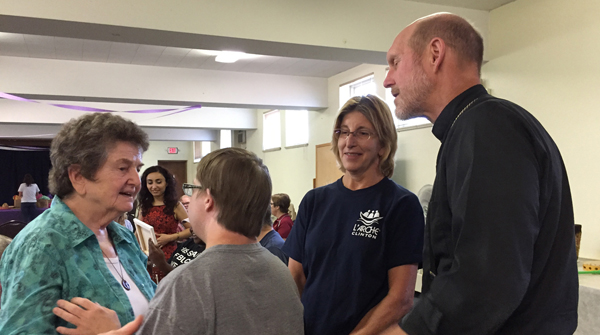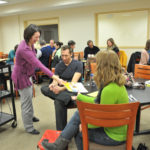
Bishop Thomas Zinkula evangelizes by going out to be with people. Here he visits with L’Arche Clinton community members and supporters during a celebration last fall. L’Arche is part of an international federation of people with and without disabilities who share life together.
By Barb Arland-Fye
The Catholic Messenger
Let’s get to the basics: Vision 20/20 aims to equip Catholics in the Davenport Diocese to become spirit-filled evangelizers who bring renewed energy and joy to the church. But first, these Catholics want to know: What is evangelization?
That question stands out as one of the greatest challenges to evangelization, according to an executive summary of 66 listening sessions held last fall and attended by 1,600 participants in parishes throughout the diocese. Participants included lay adults and youths, clergy and women religious.
Vision 20/20: From Pentecost to Pentecost is an ongoing initiative spearheaded by Bishop Thomas Zinkula to fill every heart with the joy of the Gospel and to embrace a glorious future for God’s faithful in southeast Iowa.
“Pretty much all of us no doubt know an unbaptized person who is a seeker of truth, deeper meaning in their life, the mystery of faith. Or a baptized Catholic who is no longer actively practicing our Catholic faith,” Bishop Zinkula said. “As disciples of Christ, it is our responsibility — our baptismal mission — to reach out to them and share the joy of the Gospel with them.”
During the listening sessions, led by 22 facilitators, parishioners responded to questions based on Pope Francis’ apostolic exhortation, “The Joy of the Gospel.” An understanding of what evangelization means isn’t the only challenge to evangelization that parishioners identified. Secular culture, fewer young people in the church and the clergy scandal also present challenges.
Catholics’ unease with ‘evangelization’
Catholics lack knowledge about the faith. They are uncomfortable talking about their faith; it’s not a Catholic thing to do, listening session participants said. They also identified a need for training in evangelization. Other concerns: the breakdown of the family, an obsessively busy culture (for example, sports on Wednesday nights and Sundays), and a lack of human interaction as people focus on media/electronics.
Concern also was expressed about a lack of outreach to adults in their 20s through 40s. Youths have moved to entertaining churches because they find nothing for them in the Catholic Church.
The clergy scandal — focused on some bishops’ culpability in not responding appropriately to clergy sexual abuse committed years ago — has resulted in a loss of moral authority, listening session participants said. Some see the church as old, stubborn and resistant to change. They said divorced and single parents don’t feel accepted; the church needs to be more welcoming toward them. Church leaders need to be retrained.
Reaching beyond the four walls
Asked, “How do we reach out beyond our four walls?” listening session participants offered many responses: social action, refugees and immigrants, prison ministry, outreach to the poor, sick, homebound and nursing homes. Parishioners also reach out through faith formation, CEW (Christian Experience Weekend), Vacation Bible School, baptisms and funerals. Catholic schools, social media, parish newsletters, stewardship/welcoming and hospitality are also areas of outreach.
Responses to a question about how parishes involve youth, young adults and all ages, included faith formation, Catholic schools, youth ministry and National Catholic Youth Conference (NCYC), retreats, social action, service trips, Bible study and prayer groups.
How do parishes reach out to the poor and those on the margins? Through social action, outreach to the poor, hungry and homeless, listening session participants said. Also, by reaching out to refugees and immigrants, visiting and bringing the Eucharist and parish bulletins to people who are homebound or in nursing homes. Caregiving, providing funeral dinners and healing ministries are other ways that parishioners reach out.
Responding to the pope’s message
Finally, facilitators asked listening session participants: What resonated from Pope Francis’ message in Joy of the Gospel? They responded: a personal encounter with Jesus, live joyfully, tell your faith story, missionary discipleship, live the Gospel, “Take on the smell of sheep,” step out of your comfort zone, have courage. They also noted that ministry to the poor is essential to the Gospel, and that Bishop Zinkula serves as a great role model. They also appreciated the pope’s message to be welcoming, Jesus going to the margins of society, and the idea of “boundless love.”
A second part of that question asked: What challenged you from Pope Francis’ message in Joy of the Gospel? Fear of offending, being ridiculed or rejected, a lack of energy, passion, confidence and commitment, listening session participants said. A lack of knowledge, time and energy and lack of role models were other challenges. Also, clericalism, the clergy scandals and it’s a “me world.”
What’s next?
“The listening sessions provided Bishop Zinkula and the Steering Committee with the background knowledge on what is going on in parishes as shared by parishioners,” said Sharon Roling, who co-chairs the Steering Committee with Michael Havercamp. “While most of the input was universal among parishes, there were some points unique to parishes. Starting at the regional conversations, the parish Evangelization Team will use this input as the foundation for future discussions,” she said.
Roling’s hope for next month’s regional conversations “is that the parish evangelization teams will be able to come together, identify parish evangelization goals, and determine what they need to successfully implement these goals in the coming years.” Furthermore, she hopes parishes realize that “the work of the parish evangelization team will be ongoing and the fruits of the team’s effort may take time.”
Those teams will include youth delegates, who will participate in the Vision 20/20 convocation June 6-8 at St. Ambrose University in Davenport. The youths need to “feel that they are valued participants in Vision 20/20,” Roling said. “I hope the youth will understand the importance of their presence, words and actions as the diocese works to live out the Joy of the Gospel.”
Objectives of the Vision 20/20 convocation:
• Celebrate our unity in the joy of the Gospel.
• Reflect on the call to be “Spirit-filled evangelizers.”
• Look to the peripheries of our communities.
• Read the signs of the times in the Diocese of Davenport.
• Explore practical strategies for the future.
• Begin to chart out concrete plans for taking the next steps.
• Pray for the grace to move forward in fall 2019 with the next steps. During Pentecost 2020, a diocesan celebration will be held to keep the momentum going.











